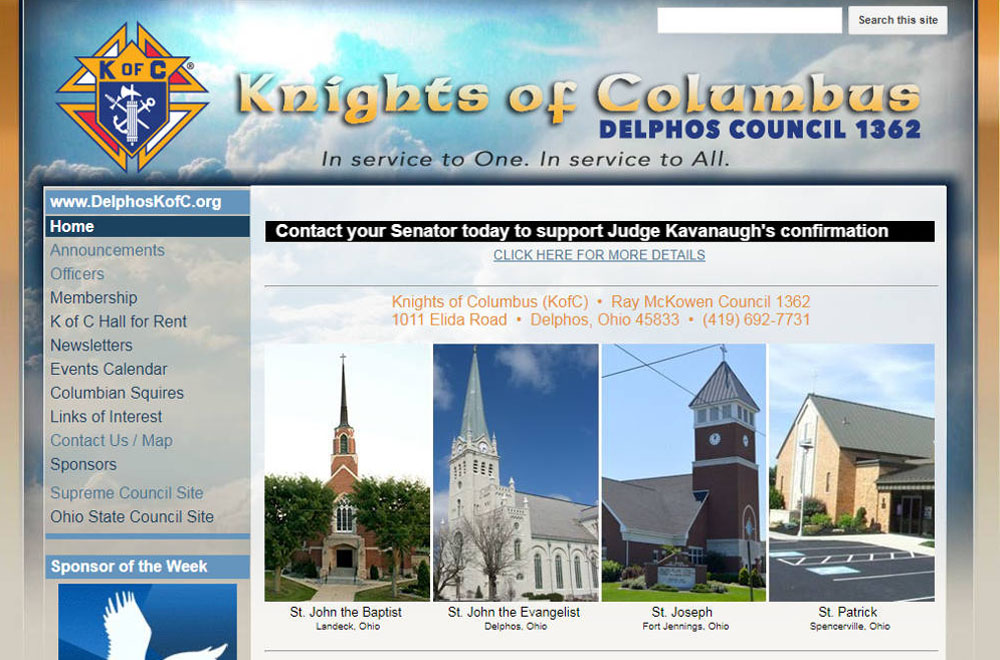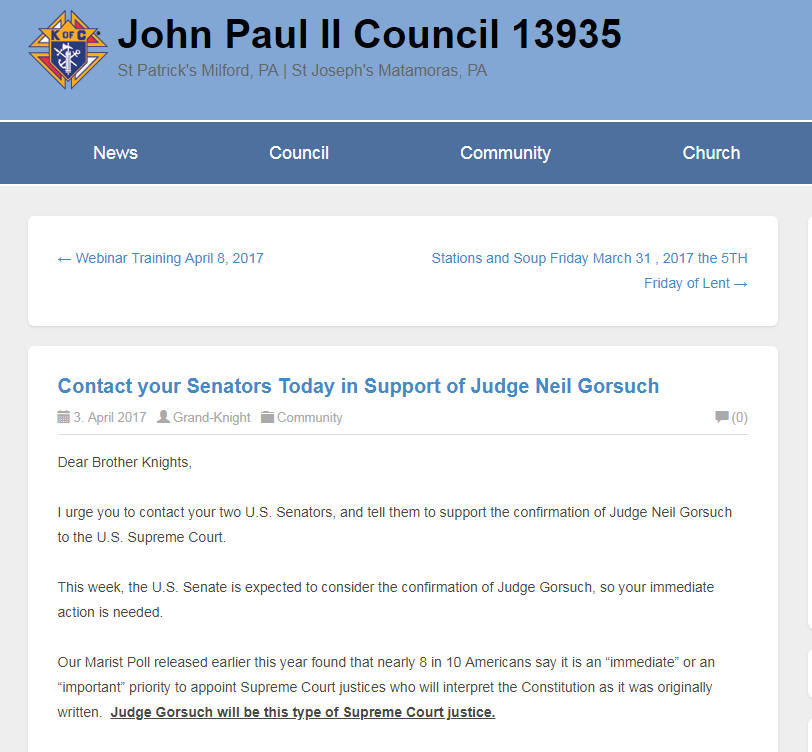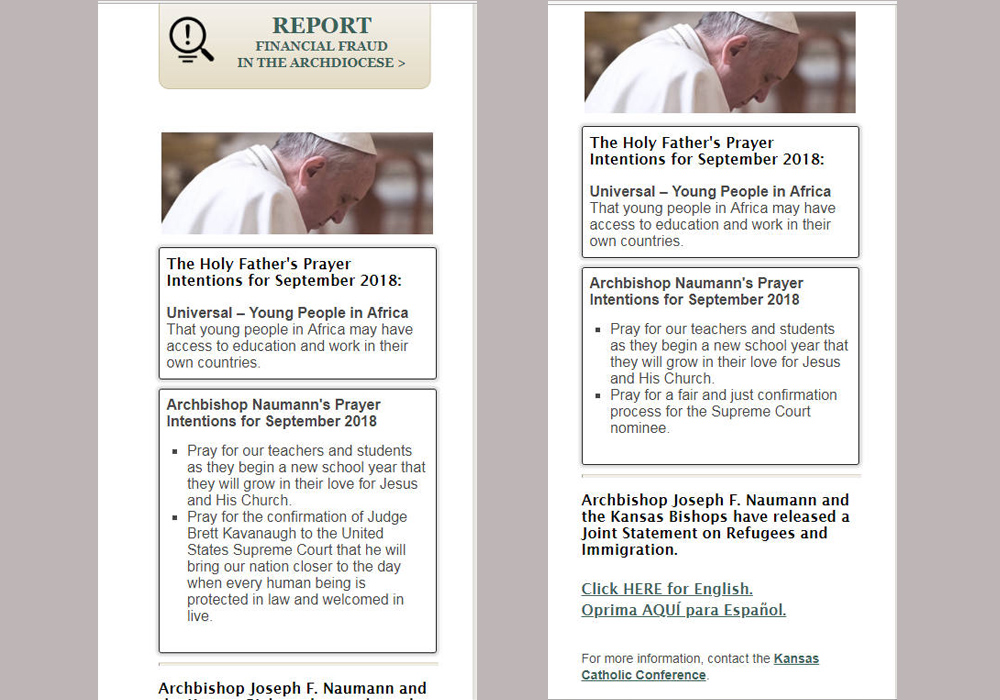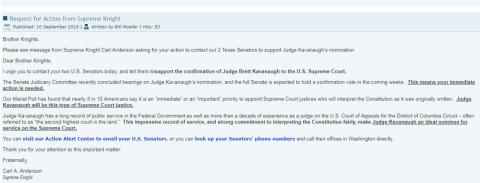
The website for Knights of Columbus Council 1362, in Delphos, Ohio, features a banner ad Sept. 26 urging Knights to contact their senators to support the confirmation of Judge Brett Kavanaugh to the U.S. Supreme Court. (NCR photo)
Days before allegations of sexual assault against Judge Brett Kavanaugh went public, the Knights of Columbus Supreme Council urged its membership to contact their senators to support the federal appellate judge's confirmation to the U.S. Supreme Court.
The Knights are one of several Catholic institutions in recent weeks that have urged their membership to support Kavanaugh's nomination for the nation's highest court, including the Archdiocese of Kansas City, Kansas, and the anti-abortion group Priests for Life.
Once seen as a surefire candidate, Kavanaugh's confirmation now faces uncertainty after Christine Blasey Ford, a psychology professor at Palo Alto University, in California, alleged he sexually assaulted her at a house party in approximately 1982, while the two were in high school in the Washington, D.C. area, with Kavanaugh attending Jesuit-run Georgetown Preparatory School. Since Blasey Ford's accusation became public, two additional women have come forward accusing Kavanaugh of sexual misconduct.
Kavanaugh has steadfastly denied the allegations and is scheduled to address them Thursday before the Senate Judiciary Committee, as is Blasey Ford.
The Knights of Columbus Supreme Council declined to answer questions about the "action alert" to its membership, estimated at 2 million worldwide, including whether it stood by its support for Kavanaugh's confirmation in light of the accusations brought against him, or if it supported an investigation beyond the Senate hearing.
The action alert from the Knights was sent Sept. 10, shortly after his Senate confirmation hearings concluded and days before the sexual abuse allegations came to light. The letter was attributed directly to Supreme Knight Carl Anderson.
"I urge you to contact your two U.S. Senators today, and tell them to support the confirmation of Judge Brett Kavanaugh to the U.S. Supreme Court," the letter began (emphasis in original), which included links to senators' contact information and a template message.
Anderson pointed to a February 2017 Marist Poll, sponsored by the Knights of Columbus, that found eight-in-10 Americans believing it an "immediate" or "important" priority for the appointment of Supreme Court justices who interpret the Constitution as it was originally written. "Judge Kavanaugh will be this type of Supreme Court justice," Anderson said, later referring to him as "an ideal nominee for service on the Supreme Court."
[Click the graphic to the right to view a screenshot of Supreme Knight Carl Anderson's request for Knights to contact their senators regarding Judge Brett Kavanaugh's Supreme Court nomination, posted Sept. 10 on the website of the Galveston-Houston chapter of the Knights of Columbus.]
While tax law limits the political activity that charities and religious organizations can engage in, the Knights of Columbus — widely known for its extensive charitable work — is registered with the IRS as a 501(c)(8) organization, or a fraternal benefit society. Such nonprofit organizations are not subject to the same limits on lobbying and endorsements as churches and many other religious groups.
The Johnson Amendment, a provision to the tax code proposed in 1954 by then-Sen. Lyndon Johnson, prohibits nonprofit 501(c)(3) tax-exempt organizations, which includes charities and private foundations, from endorsing or opposing candidates for public elected office.
"The rationale for the Johnson Amendment and for the limitation on lobbying is that charities can receive tax-deductible contributions," said Lloyd Mayer, a law professor at the University of Notre Dame who specializes in tax and election law for not-for-profit organizations. "And so that's a subsidy to them, and Congress didn't want to subsidize either campaign activity or beyond an insubstantial part lobbying."
The amendment, however, does not apply to state or federal appointments. But the IRS still limits lobbying, defined as trying to influence the action of a legislator, that such tax-exempt organizations can do, restricting such activities not to equal a "substantial" part of an organization's overall activities.
What is considered substantial is not defined, Mayer said, though case law places it around 5 percent and 20 percent of total activities. The U.S. Conference of Catholic Bishops has published on its website guidelines on political activity and lobbying for Catholic organizations.
"The reality is that most churches engaging in their normal activities who do some lobbying on the side won't get close to that level," he said.

A letter from Supreme Knight Carl Anderson urging fellow Knights to support the nomination of Judge Neil Gorsuch to the U.S. Supreme Court was posted April 3, 2017, on the website of the Knights of Columbus John Paul II Council 13935, in Milford, Pennsylvania. (NCR photo)
The Knights Supreme Council also sent an action alert in April 2017 from Anderson to its membership requesting they contact their senators in support of Judge Neil Gorsuch's confirmation. The Supreme Council declined to answer questions whether it sent action alerts to its membership regarding any other appointments by President Donald Trump or past presidents.
After Trump named Gorsuch in January 2017 as his pick to replace Justice Antonin Scalia on the court, Anderson said the Knights of Columbus "applaud" the nomination and urged Gorsuch's swift confirmation, saying he would "interpret the Constitution as it was written" as well as defend religious freedom and the right to life of every person.
An online search found the Knights' action alert on Kavanaugh posted on websites for councils across the country, including in Iowa, Ohio, Texas and Michigan. Requests for comment from a half-dozen councils who posted the action alert were not returned by press time.
One Knight unhappy with the directive from the Supreme Council was John Vienna, a 4th-degree Knight of the Thomas Lyons Council in San Dimas, California. He expressed his disagreement with the decision in an email Sept. 12 to the Knights' leadership, its supreme chaplain Baltimore Archbishop William Lori, his local bishop and several media members.
"Carl Anderson's appropriate role in OUR organization is to oversee our charitable intentions and to protect the fiduciary interests of our insurance members, not to promote his personal political views," he wrote, adding that Anderson "is not our spiritual leader" but an officer in a volunteer organization who "appears to be a political activist taking advantage of his position" and whose stances appear counter to what Pope Francis has taught.
Vienna told NCR in an email he has spoken about the action alert with a few of his fellow Knights, who he said were supportive of his disagreement. He said he understands that the Knights have lobbied for years on pro-life issues, but felt it was "not ethically appropriate" for the organization to leverage its membership in an effort to influence American politics.
"I personally don’t feel that the organization, being Catholic and meeting in Catholic Churches throughout the country, should be involved in lobbying or legislation at all," Vienna said.
Outside the Knights, at least two other prominent Catholic figures also publicly advocated for Catholics to support Kavanaugh's nomination.
Archbishop Joseph Naumann of Kansas City, Kansas, the chair-elect of the U.S. bishops' Committee on Pro-Life Activities, included in his September prayer intentions that Catholics "Pray for the confirmation of Judge Brett Kavanaugh to the United States Supreme Court that he will bring our nation closer to the day when every human being is protected in law and welcomed in live (sic)."
The direct appeal on Kavanaugh's behalf, posted on the archdiocese's website, stood out from the approach of the current head of the pro-life committee. In July chair Cardinal Timothy Dolan called for a nine-week nationwide novena praying for a change on the Supreme Court toward protection of all life under the law. The New York archbishop, though, made clear in his announcement that the conference "does not support or oppose the confirmation of any presidential nominee."
After an inquiry Sept. 25 by NCR to the Kansas City Archdiocese, the text of the prayer intention was changed to "Pray for a fair and just confirmation process for the Supreme Court nominee."

Left screenshot: The Kansas City, Kansas Archdiocese website Sept. 25 shows a prayer intention from Archbishop Joseph Naumann that Catholics "pray for the confirmation of Judge Brett Kavanaugh to the United States Supreme Court." Right screenshot: After an NCR inquiry, the prayer intention was edited to read to "pray for a fair and just confirmation process for the Supreme Court nominee. (NCR photos)
The archdiocese told NCR that Naumann was unavailable for comment on his prayer intention, including why it was edited, due to attending a continuing education workshop with his priests.
A day earlier, Fr. Frank Pavone, the national director of Priests for Life, urged his own supporters to contact their senators to support Kavanaugh. He directly addressed the "lunacy" that has enveloped the nominee's confirmation, calling the sexual assault allegations against the judge "unproven" events that took place decades ago.
"Democrats do not want Judge Kavanaugh on the Supreme Court," Pavone wrote. "Their strategy is simple: get as many people as possible to hurl unsubstantiated allegations at Judge Kavanaugh. Then if there is the slightest objection to the allegations or to any further delays in the confirmation process, accuse the Republicans of being anti-woman, insensitive monsters, and use this to turn the voters against them."
Pavone, who served on the Trump campaign's Catholic advisory council, has engaged in political advocacy before. Days before the 2016 presidential election, the priest live-streamed an aborted fetus on a Catholic altar in an effort to demonstrate the stark differences between the two candidates.
"Today I am showing him to you because in this election we have to decide if we will allow this child killing to continue in America or not," Pavone said at the time. "Hillary Clinton and the Democratic platform says yes, let the child-killing continue (and you pay for it); Donald Trump and the Republican platform says no, the child should be protected."
The public support for a Supreme Court nominee expressed by Pavone and Naumann, while uncommon, likely do not place them in danger of violating what's allowed for nonprofits, Mayer told NCR.
"One message, even in a widely distributed newsletter, probably doesn't get anywhere close to being a substantial part of what that organization does. It does many other things," Mayer said.
The sexual abuse allegations against Kavanaugh, who is Catholic, come as the U.S. Catholic Church has faced a summer dominated by a resurgence of its own clergy abuse scandal.
Both Naumann and Anderson addressed the scandal and how the church should respond to accusations of sexual abuse or cover-up by those in its highest ranks.
Advertisement
"Archbishop [Theodore] McCarrick and others at fault owe us a full account of their actions, motivations and cover-ups. After years of having us confess to them, it is now time for them to come clean about what they have done and what they have failed to do," Anderson said in an August letter to his fellow Knights.
In a column for his archdiocesan newspaper, Naumann said that "an essential part of our response must be a deepened commitment to care for the victims of these crimes committed by representatives of the church." He added that he applauded the "commitment to pursue the truth" by Cardinal Daniel DiNardo, president of the U.S. bishops’ conference, into how McCarrick was allowed to remain and to advance in ministry despite knowledge of his alleged sexual misconduct with adult males and seminarians.
"We must do all that we can to ascertain the truth and then allow the chips to fall where they may," Naumann wrote.
[Brian Roewe is an NCR staff writer. His email address is broewe@ncronline.org. Follow him on Twitter: @BrianRoewe.]








